Impact of Data-Driven Decision Making and Artificial Intelligence
VerifiedAdded on 2020/10/22
|11
|1189
|203
Report
AI Summary
This report examines the efficiency of data-driven decision making (DDD) and artificial intelligence (AI) within a business organization. It begins with an introduction defining DDD as a data-reliant approach to business decisions and AI as a branch of computer science focused on creating intelligent machines. The research aim is to analyze the efficiency of DDD and AI, addressing the research question of how these technologies improve financial and operational performance. The report reviews existing literature, emphasizing the role of DDD in analyzing big data and AI in improving operational activities through technological advancements. A quantitative research method, including questionnaires, mean calculations, regression, and correlation analysis, is employed to interpret data. Findings reveal the positive impact of AI and DDD on organizational productivity and profitability, supported by regression and correlation values. The report concludes by summarizing the research findings and recommendations, highlighting the value of integrating these technologies in modern business strategies.
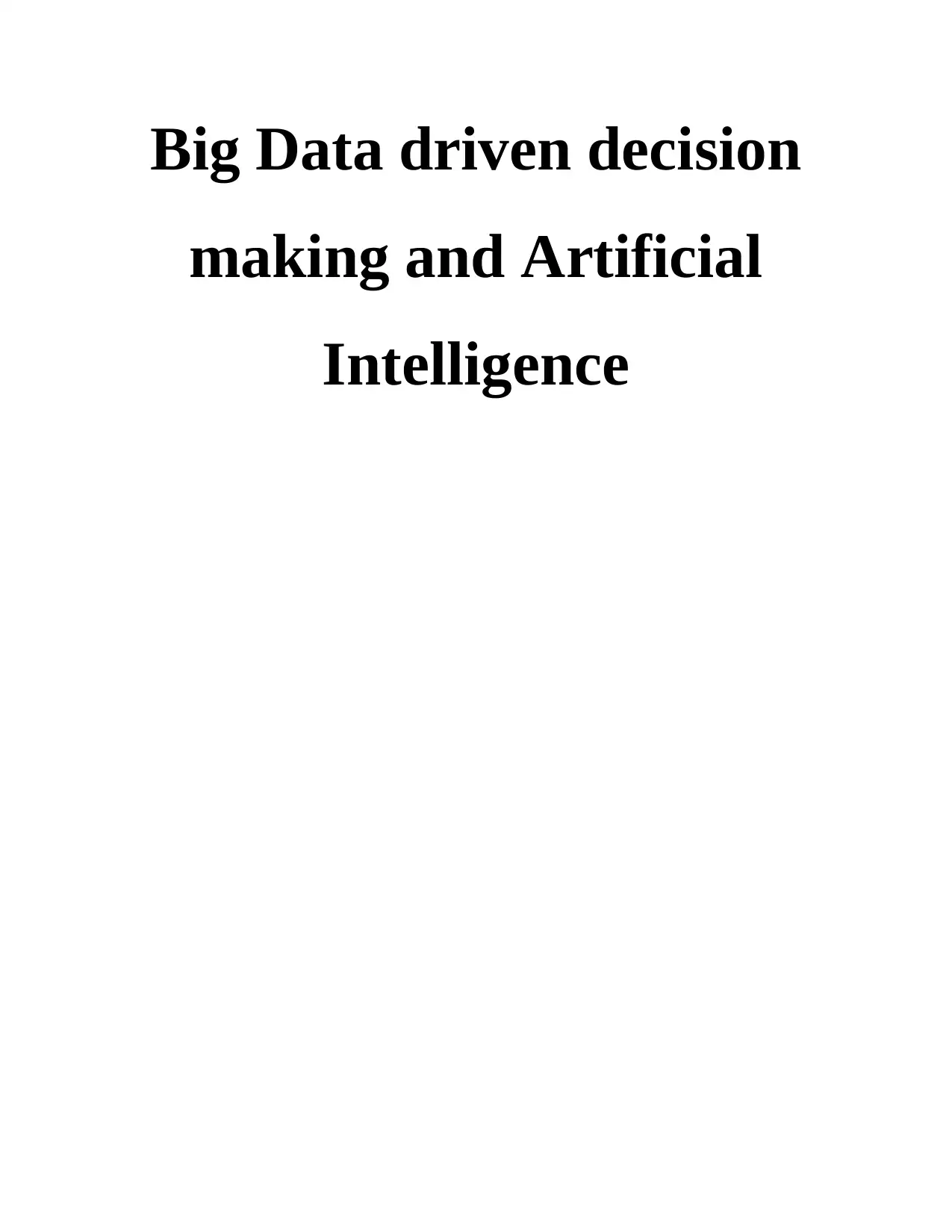
Big Data driven decision
making and Artificial
Intelligence
making and Artificial
Intelligence
Paraphrase This Document
Need a fresh take? Get an instant paraphrase of this document with our AI Paraphraser

Table of Contents
INTRODUCTION...........................................................................................................................1
THEORY, LITERATURE AND MODEL......................................................................................1
CONCLUSION................................................................................................................................4
REFERENCES................................................................................................................................5
APPENDIX......................................................................................................................................6
INTRODUCTION...........................................................................................................................1
THEORY, LITERATURE AND MODEL......................................................................................1
CONCLUSION................................................................................................................................4
REFERENCES................................................................................................................................5
APPENDIX......................................................................................................................................6
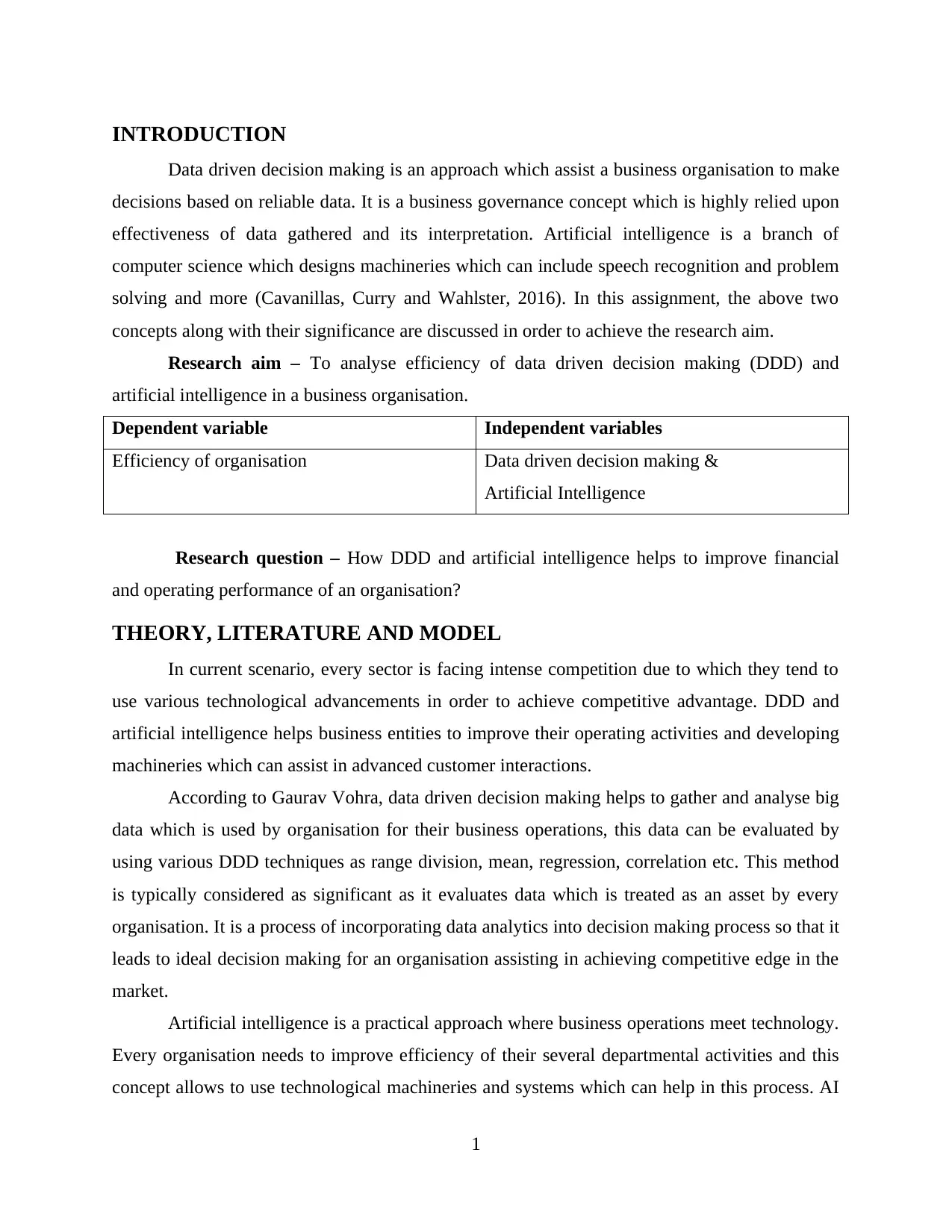
INTRODUCTION
Data driven decision making is an approach which assist a business organisation to make
decisions based on reliable data. It is a business governance concept which is highly relied upon
effectiveness of data gathered and its interpretation. Artificial intelligence is a branch of
computer science which designs machineries which can include speech recognition and problem
solving and more (Cavanillas, Curry and Wahlster, 2016). In this assignment, the above two
concepts along with their significance are discussed in order to achieve the research aim.
Research aim – To analyse efficiency of data driven decision making (DDD) and
artificial intelligence in a business organisation.
Dependent variable Independent variables
Efficiency of organisation Data driven decision making &
Artificial Intelligence
Research question – How DDD and artificial intelligence helps to improve financial
and operating performance of an organisation?
THEORY, LITERATURE AND MODEL
In current scenario, every sector is facing intense competition due to which they tend to
use various technological advancements in order to achieve competitive advantage. DDD and
artificial intelligence helps business entities to improve their operating activities and developing
machineries which can assist in advanced customer interactions.
According to Gaurav Vohra, data driven decision making helps to gather and analyse big
data which is used by organisation for their business operations, this data can be evaluated by
using various DDD techniques as range division, mean, regression, correlation etc. This method
is typically considered as significant as it evaluates data which is treated as an asset by every
organisation. It is a process of incorporating data analytics into decision making process so that it
leads to ideal decision making for an organisation assisting in achieving competitive edge in the
market.
Artificial intelligence is a practical approach where business operations meet technology.
Every organisation needs to improve efficiency of their several departmental activities and this
concept allows to use technological machineries and systems which can help in this process. AI
1
Data driven decision making is an approach which assist a business organisation to make
decisions based on reliable data. It is a business governance concept which is highly relied upon
effectiveness of data gathered and its interpretation. Artificial intelligence is a branch of
computer science which designs machineries which can include speech recognition and problem
solving and more (Cavanillas, Curry and Wahlster, 2016). In this assignment, the above two
concepts along with their significance are discussed in order to achieve the research aim.
Research aim – To analyse efficiency of data driven decision making (DDD) and
artificial intelligence in a business organisation.
Dependent variable Independent variables
Efficiency of organisation Data driven decision making &
Artificial Intelligence
Research question – How DDD and artificial intelligence helps to improve financial
and operating performance of an organisation?
THEORY, LITERATURE AND MODEL
In current scenario, every sector is facing intense competition due to which they tend to
use various technological advancements in order to achieve competitive advantage. DDD and
artificial intelligence helps business entities to improve their operating activities and developing
machineries which can assist in advanced customer interactions.
According to Gaurav Vohra, data driven decision making helps to gather and analyse big
data which is used by organisation for their business operations, this data can be evaluated by
using various DDD techniques as range division, mean, regression, correlation etc. This method
is typically considered as significant as it evaluates data which is treated as an asset by every
organisation. It is a process of incorporating data analytics into decision making process so that it
leads to ideal decision making for an organisation assisting in achieving competitive edge in the
market.
Artificial intelligence is a practical approach where business operations meet technology.
Every organisation needs to improve efficiency of their several departmental activities and this
concept allows to use technological machineries and systems which can help in this process. AI
1
⊘ This is a preview!⊘
Do you want full access?
Subscribe today to unlock all pages.

Trusted by 1+ million students worldwide
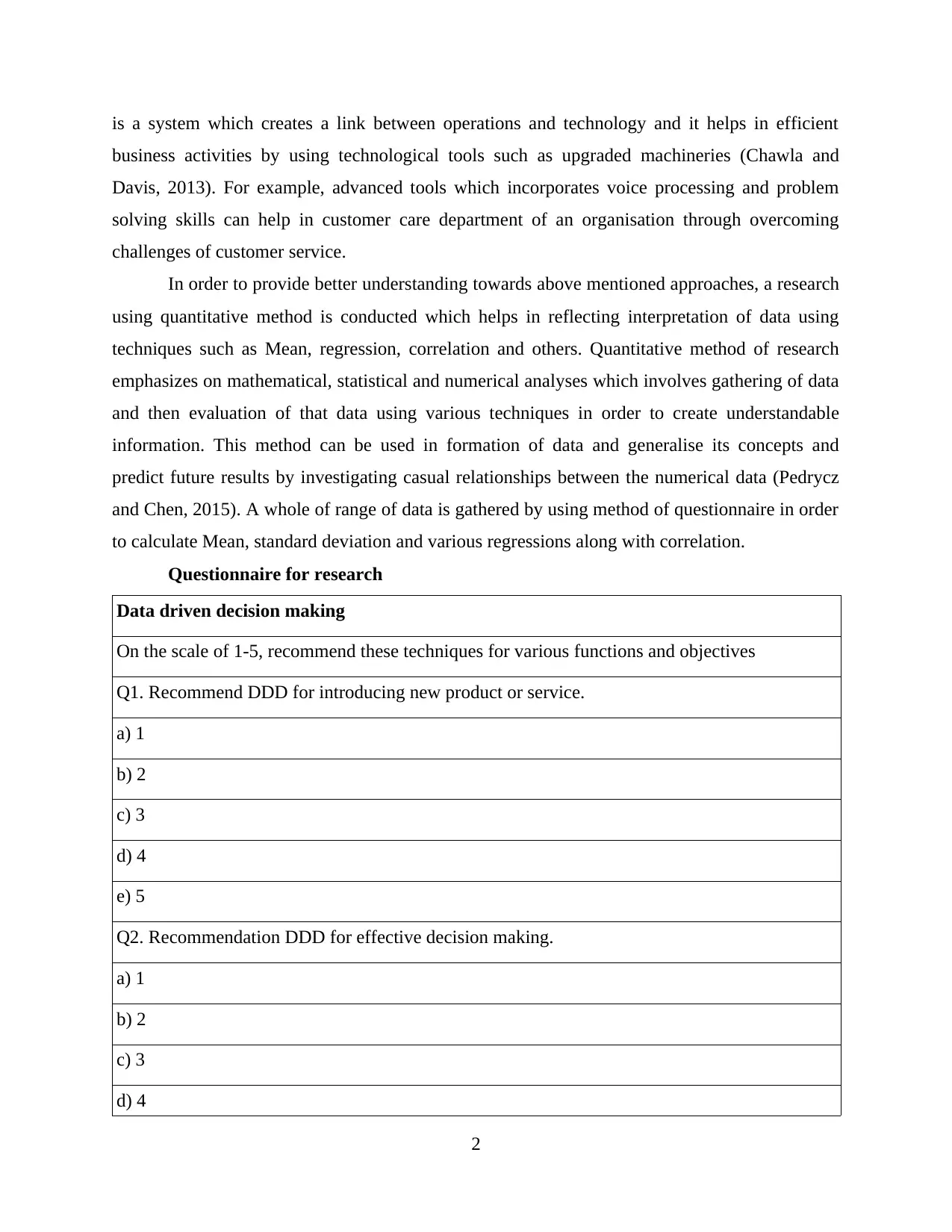
is a system which creates a link between operations and technology and it helps in efficient
business activities by using technological tools such as upgraded machineries (Chawla and
Davis, 2013). For example, advanced tools which incorporates voice processing and problem
solving skills can help in customer care department of an organisation through overcoming
challenges of customer service.
In order to provide better understanding towards above mentioned approaches, a research
using quantitative method is conducted which helps in reflecting interpretation of data using
techniques such as Mean, regression, correlation and others. Quantitative method of research
emphasizes on mathematical, statistical and numerical analyses which involves gathering of data
and then evaluation of that data using various techniques in order to create understandable
information. This method can be used in formation of data and generalise its concepts and
predict future results by investigating casual relationships between the numerical data (Pedrycz
and Chen, 2015). A whole of range of data is gathered by using method of questionnaire in order
to calculate Mean, standard deviation and various regressions along with correlation.
Questionnaire for research
Data driven decision making
On the scale of 1-5, recommend these techniques for various functions and objectives
Q1. Recommend DDD for introducing new product or service.
a) 1
b) 2
c) 3
d) 4
e) 5
Q2. Recommendation DDD for effective decision making.
a) 1
b) 2
c) 3
d) 4
2
business activities by using technological tools such as upgraded machineries (Chawla and
Davis, 2013). For example, advanced tools which incorporates voice processing and problem
solving skills can help in customer care department of an organisation through overcoming
challenges of customer service.
In order to provide better understanding towards above mentioned approaches, a research
using quantitative method is conducted which helps in reflecting interpretation of data using
techniques such as Mean, regression, correlation and others. Quantitative method of research
emphasizes on mathematical, statistical and numerical analyses which involves gathering of data
and then evaluation of that data using various techniques in order to create understandable
information. This method can be used in formation of data and generalise its concepts and
predict future results by investigating casual relationships between the numerical data (Pedrycz
and Chen, 2015). A whole of range of data is gathered by using method of questionnaire in order
to calculate Mean, standard deviation and various regressions along with correlation.
Questionnaire for research
Data driven decision making
On the scale of 1-5, recommend these techniques for various functions and objectives
Q1. Recommend DDD for introducing new product or service.
a) 1
b) 2
c) 3
d) 4
e) 5
Q2. Recommendation DDD for effective decision making.
a) 1
b) 2
c) 3
d) 4
2
Paraphrase This Document
Need a fresh take? Get an instant paraphrase of this document with our AI Paraphraser
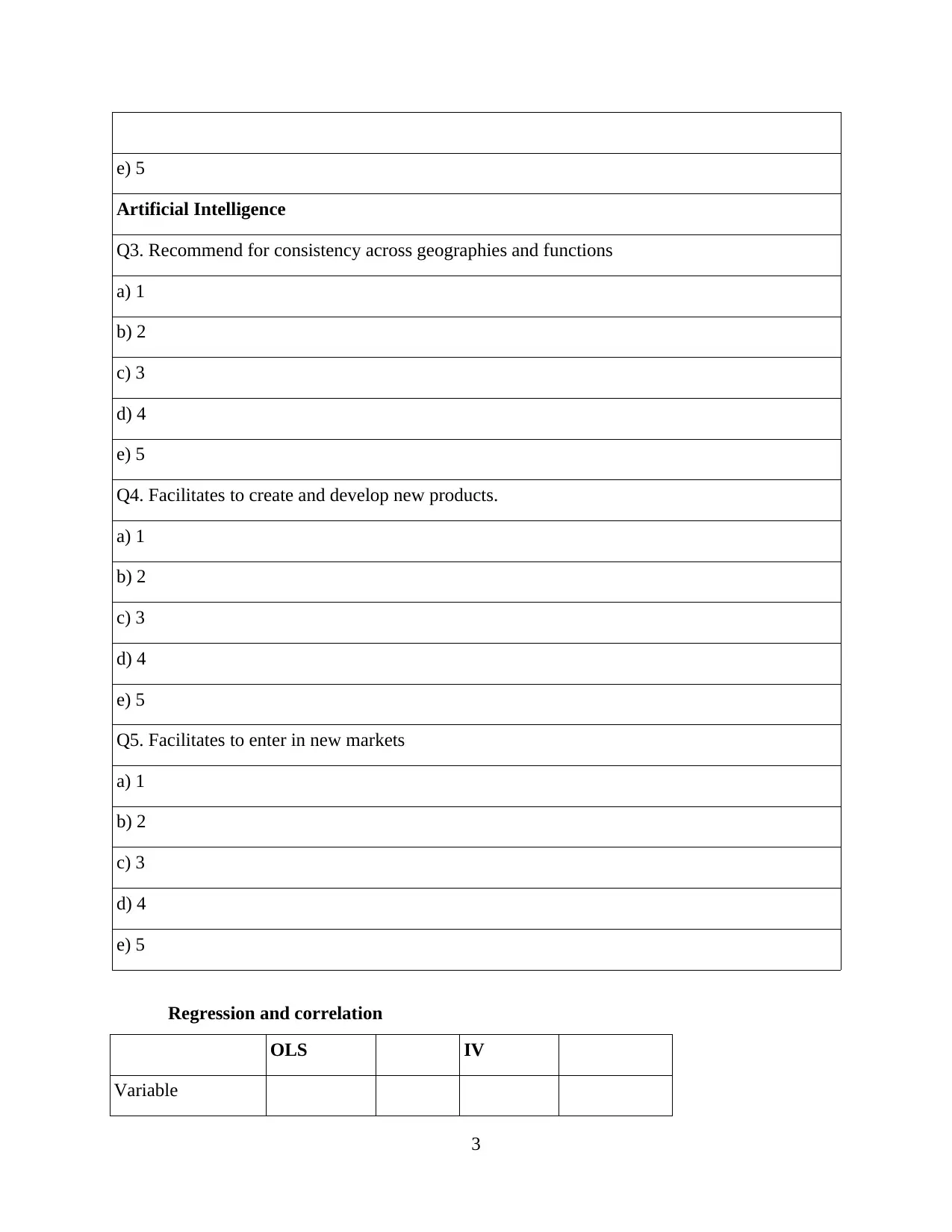
e) 5
Artificial Intelligence
Q3. Recommend for consistency across geographies and functions
a) 1
b) 2
c) 3
d) 4
e) 5
Q4. Facilitates to create and develop new products.
a) 1
b) 2
c) 3
d) 4
e) 5
Q5. Facilitates to enter in new markets
a) 1
b) 2
c) 3
d) 4
e) 5
Regression and correlation
OLS IV
Variable
3
Artificial Intelligence
Q3. Recommend for consistency across geographies and functions
a) 1
b) 2
c) 3
d) 4
e) 5
Q4. Facilitates to create and develop new products.
a) 1
b) 2
c) 3
d) 4
e) 5
Q5. Facilitates to enter in new markets
a) 1
b) 2
c) 3
d) 4
e) 5
Regression and correlation
OLS IV
Variable
3
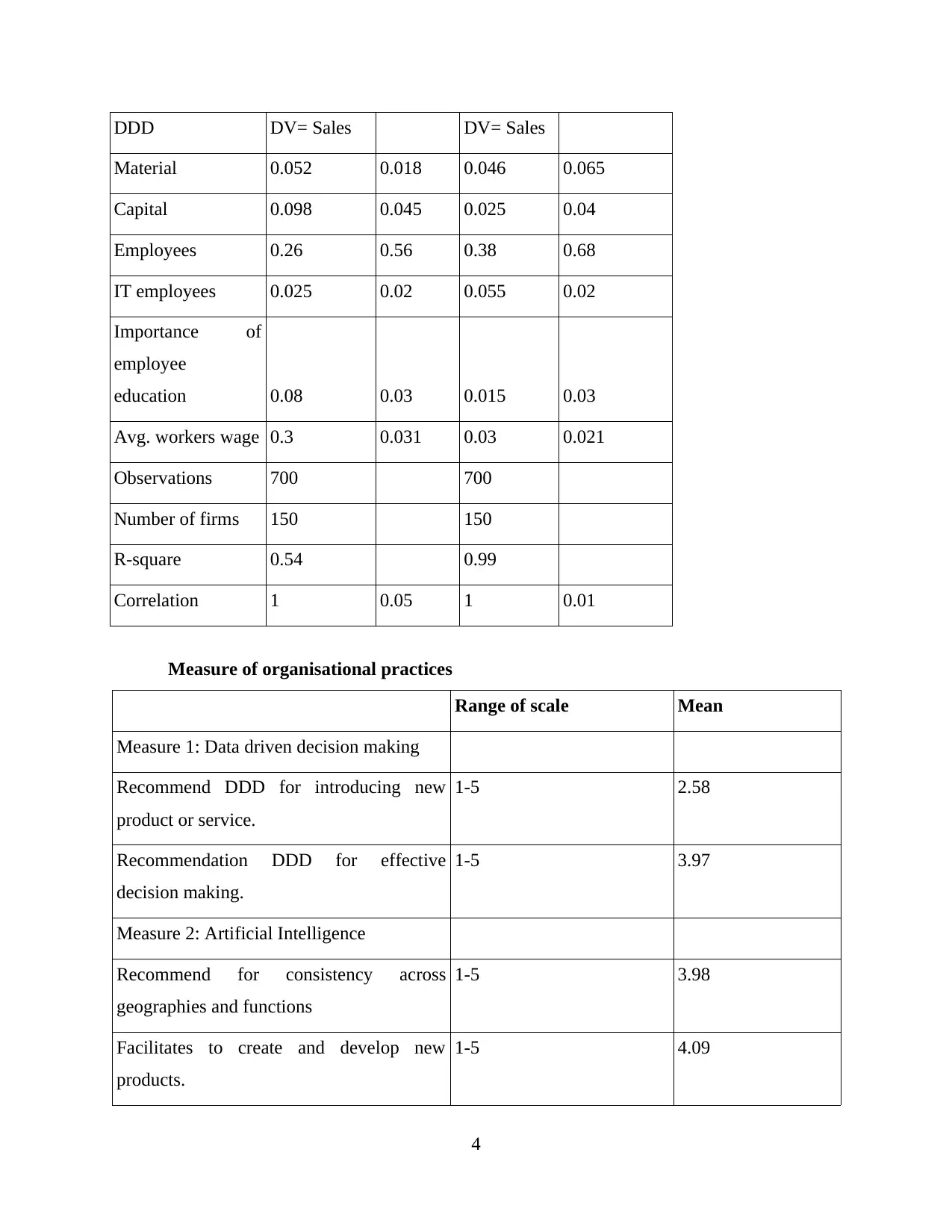
DDD DV= Sales DV= Sales
Material 0.052 0.018 0.046 0.065
Capital 0.098 0.045 0.025 0.04
Employees 0.26 0.56 0.38 0.68
IT employees 0.025 0.02 0.055 0.02
Importance of
employee
education 0.08 0.03 0.015 0.03
Avg. workers wage 0.3 0.031 0.03 0.021
Observations 700 700
Number of firms 150 150
R-square 0.54 0.99
Correlation 1 0.05 1 0.01
Measure of organisational practices
Range of scale Mean
Measure 1: Data driven decision making
Recommend DDD for introducing new
product or service.
1-5 2.58
Recommendation DDD for effective
decision making.
1-5 3.97
Measure 2: Artificial Intelligence
Recommend for consistency across
geographies and functions
1-5 3.98
Facilitates to create and develop new
products.
1-5 4.09
4
Material 0.052 0.018 0.046 0.065
Capital 0.098 0.045 0.025 0.04
Employees 0.26 0.56 0.38 0.68
IT employees 0.025 0.02 0.055 0.02
Importance of
employee
education 0.08 0.03 0.015 0.03
Avg. workers wage 0.3 0.031 0.03 0.021
Observations 700 700
Number of firms 150 150
R-square 0.54 0.99
Correlation 1 0.05 1 0.01
Measure of organisational practices
Range of scale Mean
Measure 1: Data driven decision making
Recommend DDD for introducing new
product or service.
1-5 2.58
Recommendation DDD for effective
decision making.
1-5 3.97
Measure 2: Artificial Intelligence
Recommend for consistency across
geographies and functions
1-5 3.98
Facilitates to create and develop new
products.
1-5 4.09
4
⊘ This is a preview!⊘
Do you want full access?
Subscribe today to unlock all pages.

Trusted by 1+ million students worldwide
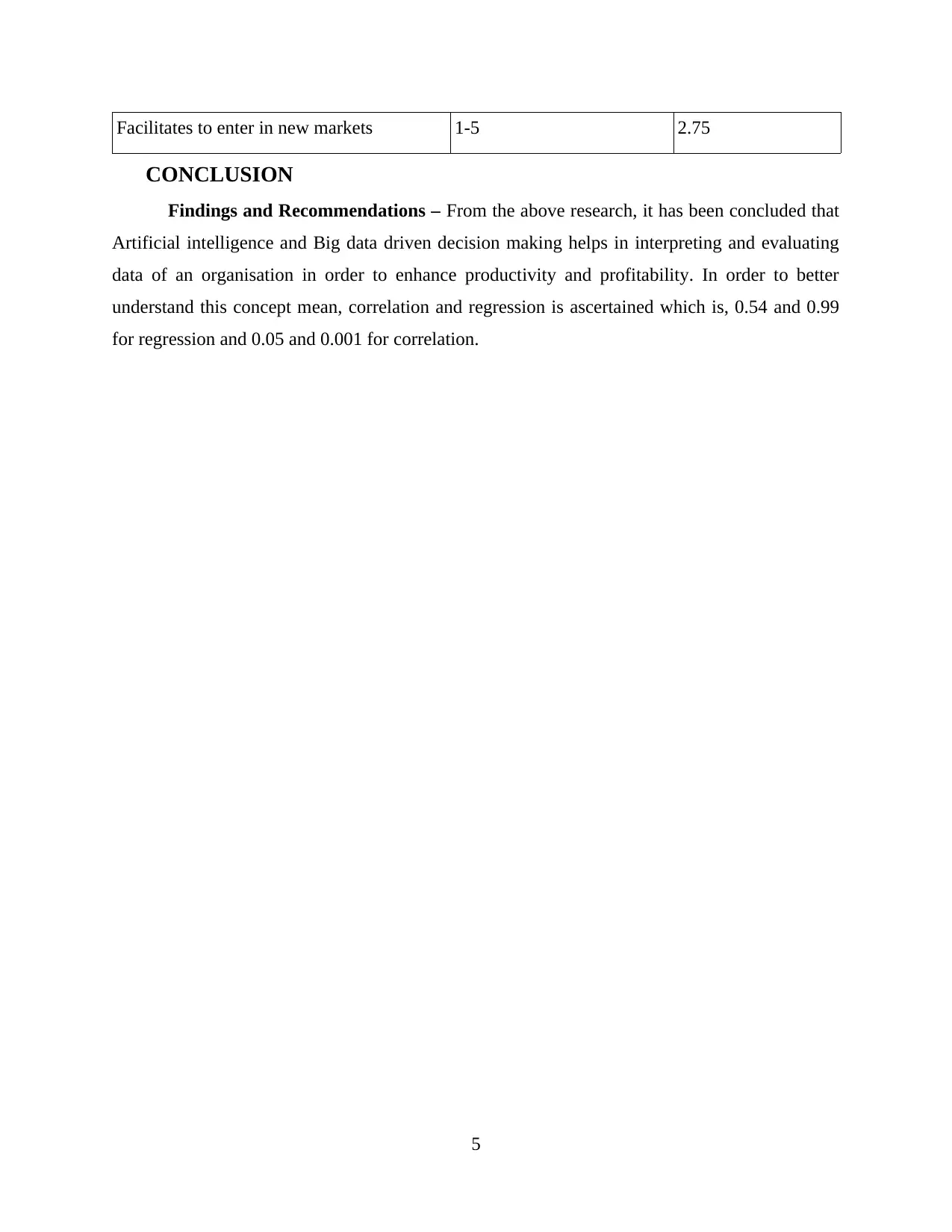
Facilitates to enter in new markets 1-5 2.75
CONCLUSION
Findings and Recommendations – From the above research, it has been concluded that
Artificial intelligence and Big data driven decision making helps in interpreting and evaluating
data of an organisation in order to enhance productivity and profitability. In order to better
understand this concept mean, correlation and regression is ascertained which is, 0.54 and 0.99
for regression and 0.05 and 0.001 for correlation.
5
CONCLUSION
Findings and Recommendations – From the above research, it has been concluded that
Artificial intelligence and Big data driven decision making helps in interpreting and evaluating
data of an organisation in order to enhance productivity and profitability. In order to better
understand this concept mean, correlation and regression is ascertained which is, 0.54 and 0.99
for regression and 0.05 and 0.001 for correlation.
5
Paraphrase This Document
Need a fresh take? Get an instant paraphrase of this document with our AI Paraphraser
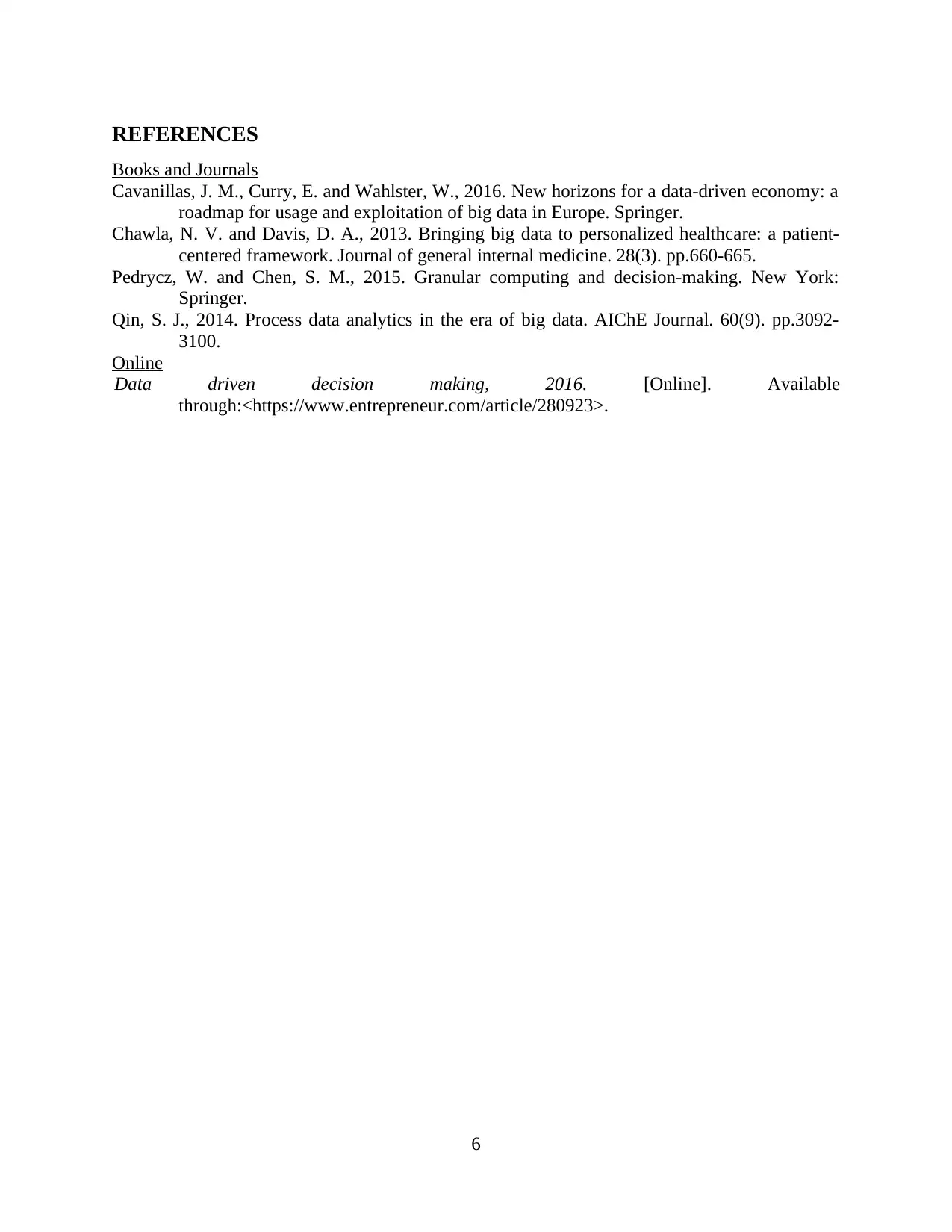
REFERENCES
Books and Journals
Cavanillas, J. M., Curry, E. and Wahlster, W., 2016. New horizons for a data-driven economy: a
roadmap for usage and exploitation of big data in Europe. Springer.
Chawla, N. V. and Davis, D. A., 2013. Bringing big data to personalized healthcare: a patient-
centered framework. Journal of general internal medicine. 28(3). pp.660-665.
Pedrycz, W. and Chen, S. M., 2015. Granular computing and decision-making. New York:
Springer.
Qin, S. J., 2014. Process data analytics in the era of big data. AIChE Journal. 60(9). pp.3092-
3100.
Online
Data driven decision making, 2016. [Online]. Available
through:<https://www.entrepreneur.com/article/280923>.
6
Books and Journals
Cavanillas, J. M., Curry, E. and Wahlster, W., 2016. New horizons for a data-driven economy: a
roadmap for usage and exploitation of big data in Europe. Springer.
Chawla, N. V. and Davis, D. A., 2013. Bringing big data to personalized healthcare: a patient-
centered framework. Journal of general internal medicine. 28(3). pp.660-665.
Pedrycz, W. and Chen, S. M., 2015. Granular computing and decision-making. New York:
Springer.
Qin, S. J., 2014. Process data analytics in the era of big data. AIChE Journal. 60(9). pp.3092-
3100.
Online
Data driven decision making, 2016. [Online]. Available
through:<https://www.entrepreneur.com/article/280923>.
6
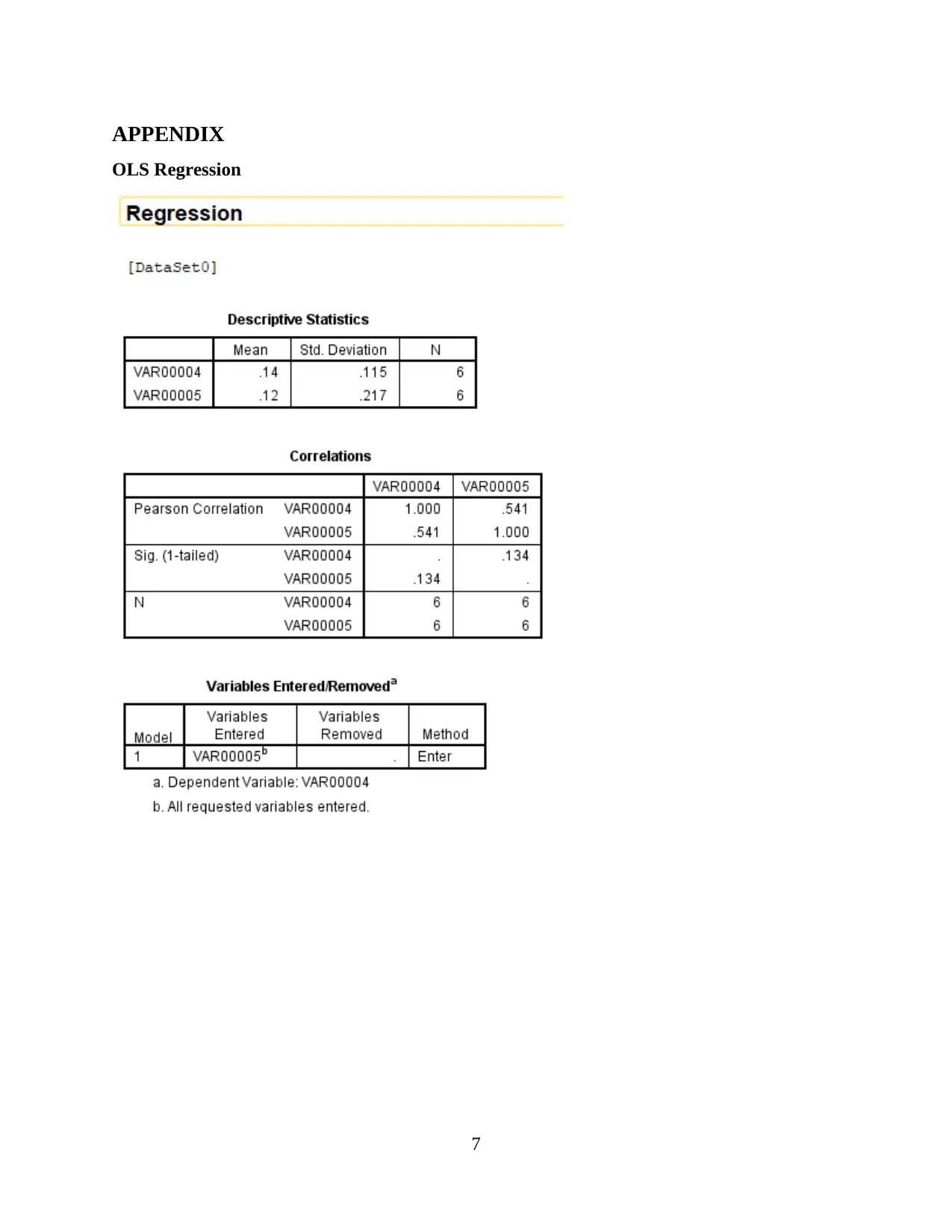
APPENDIX
OLS Regression
7
OLS Regression
7
⊘ This is a preview!⊘
Do you want full access?
Subscribe today to unlock all pages.

Trusted by 1+ million students worldwide
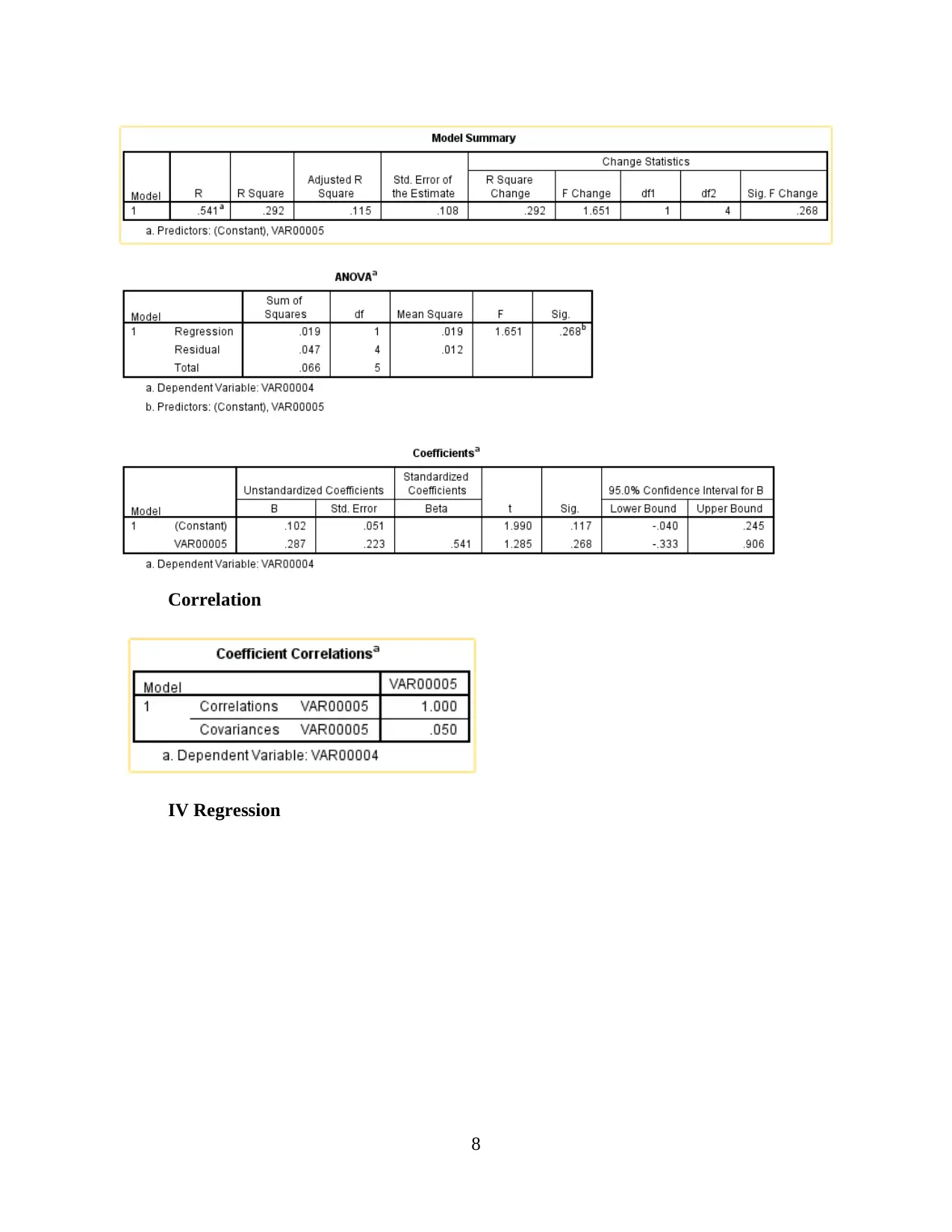
Correlation
IV Regression
8
IV Regression
8
Paraphrase This Document
Need a fresh take? Get an instant paraphrase of this document with our AI Paraphraser
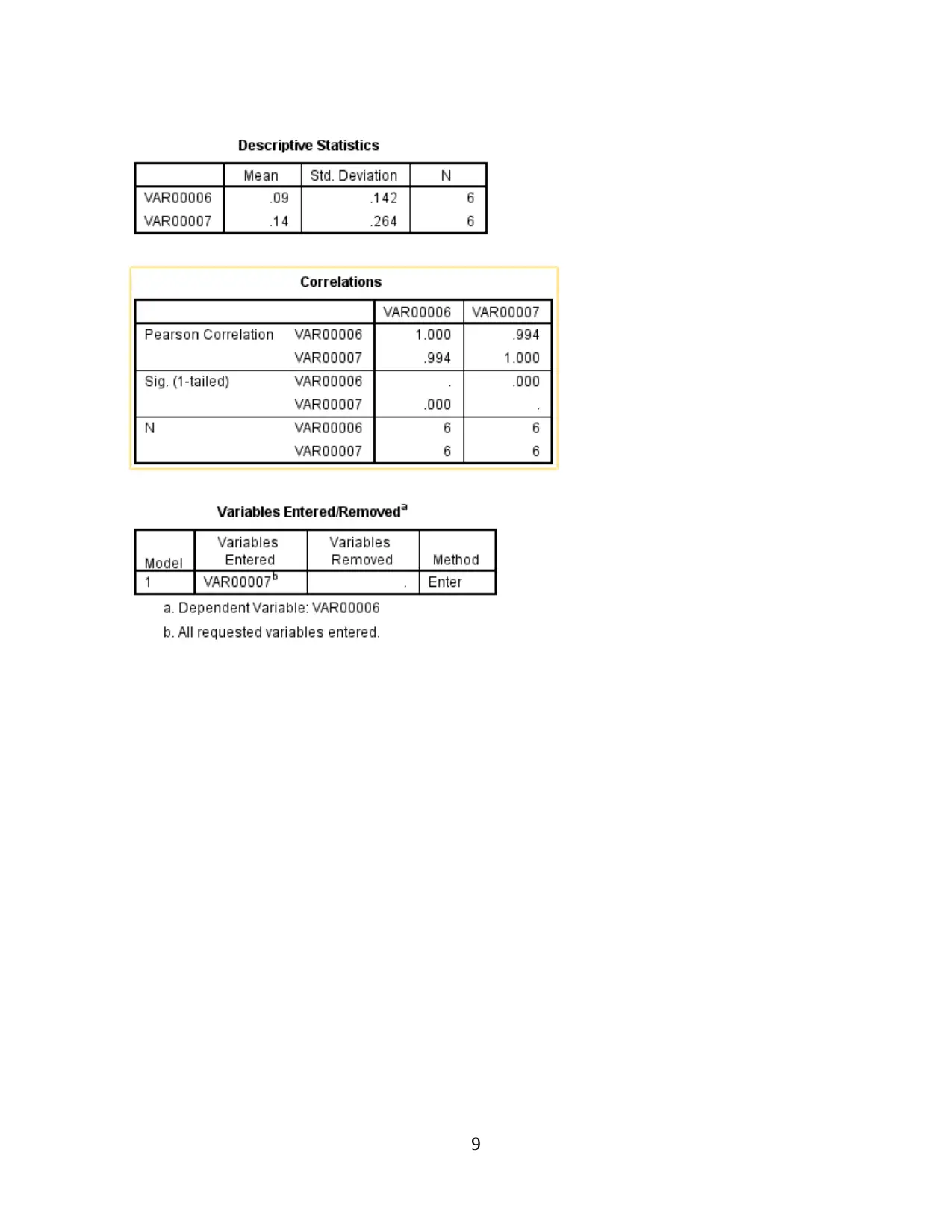
9
1 out of 11
Related Documents
Your All-in-One AI-Powered Toolkit for Academic Success.
+13062052269
info@desklib.com
Available 24*7 on WhatsApp / Email
![[object Object]](/_next/static/media/star-bottom.7253800d.svg)
Unlock your academic potential
Copyright © 2020–2026 A2Z Services. All Rights Reserved. Developed and managed by ZUCOL.

